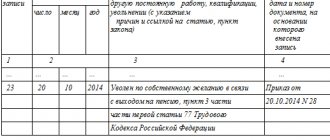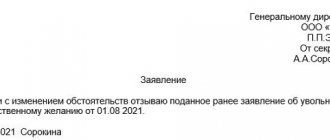Rights and obligations
The main obligation of an employee who decides to terminate an employment contract is to notify the employer 2 weeks before the last working day of his desire to quit (Labor Code of the Russian Federation, Article 80). Termination of employment relations does not depend on the will of the company’s management. A citizen who has provided a written statement about this must be dismissed:
- issue settlement notes;
- issue the necessary documents and certificates;
- issue a properly executed work book.
If the parties agreed to terminate the employment relationship earlier, there is no need to wait two weeks. In some cases, the employer is obliged to dismiss the citizen within the period that he indicates in the application:
- violation of labor legislation, labor regulations, contractual obligations on the part of the company’s management;
- retirement;
- the need to learn;
- sending a spouse to a new duty station;
- other cases that objectively interfere with the performance of labor duties.
The legislation also has other deadlines for written notifications:
- for the manager – 1 month (Labor Code of the Russian Federation, Article 280);
- seasonal worker – 3 days (Labor Code of the Russian Federation, Article 296);
- working for an individual - the period is established by the employment contract (Labor Code of the Russian Federation, Article 307);
- for a citizen on probation – 3 days (Labor Code of the Russian Federation, Article 71).
For certain categories of employees, for example, athletes, etc., different notification periods for their upcoming dismissal may be established. They are prescribed in federal laws.
In the Labor Code of the Russian Federation, Art. 80 indicates the employee’s ability to withdraw his written notice (application) and continue to work if the maximum period before dismissal has not expired. At the same time, if the application contains a request for leave with subsequent dismissal, such a document can be recalled only at the beginning of the leave (Labor Code of the Russian Federation, Art. 127).
Attention! When calculating deadlines, calendar days are taken (Labor Code of the Russian Federation, Article 14).
So, the employee is not required to take permission from the administration to quit. But what to do if the manager does not accept the application, from the date of submission of which the period until the last day of work is counted?
What to do if an employee wants to leave his job of his own free will, but is not allowed to do so?
What should an employee do if the employer does not dismiss him from his job at his own request? In accordance with Art. 352 of the Labor Code of the Russian Federation, an employee has the right to protect his labor rights by any legal means . If you do not want to dismiss at your own request, the most effective way is to contact the competent authorities.
- Protection by a trade union organization.
If the enterprise has a trade union organization, then the employee can first contact them.
In accordance with Art. 370 of the Labor Code of the Russian Federation, a trade union has the right to create a labor inspectorate within an enterprise to investigate violations of the labor rights of employees.
The application is written in free form addressed to the chairman of the trade union organization. It indicates the essence of the complaint with reference to Art. 80 of the Labor Code of the Russian Federation, a list of documents that could help the investigation (correspondence, recordings of conversations, etc.).
The application must be dated and signed.
- Contacting government agencies.
These include the labor inspectorate and the prosecutor's office. To protect labor rights, you must submit an application indicating:
- in the header - the name of the body from whom the application comes (full name, place of work, position, personal address and contacts);
- in the main part - the name of the organization, information about the employer (full name, position), a link to the employment contract, the essence of the complaint with reference to Art. 80 Labor Code of the Russian Federation;
- list of attached documents;
- date and signature with transcript.
- Filing an application to the court.
Important! Simultaneously with the complaint to the labor inspectorate, the employee has the right to file a claim with the court to recognize the employment relationship as terminated, to issue a calculation and documents (work book, income certificate, etc.).
The claim is filed in the district court at the place of residence (Article 24 and Part 6.3 of Article 29 of the Code of Civil Procedure of the Russian Federation).
How to protect your rights?
How to resign of your own free will if you are not allowed to leave? An employee who wants to leave his job must follow the following algorithm.
- Write an application in two copies and submit it to the office, human resources department, secretary or personally to the employer.
Refusal to register an application is a violation of the labor rights of workers. If the reminder does not work, you must proceed to the second step. The application must be written according to all the rules: the employee must understand that if I want to effectively use my rights, then everything must be within the legal framework.
- Send the application by registered mail with notification.
A notice of acceptance is proof that the application has been received by the employer whether he wants to fire the employee or not.
- Workout.
Regardless of whether the notice was received or the employer refused to put his signature on it, the employee is required to work for 2 weeks (3 days - if the work was carried out under a fixed-term employment contract for a period of up to 2 months, 1 month - if an athlete, coach or head of an organization resigns ).
After completion of work, the employee has the right not to go to work.
- Requirement of calculation and work book.
Labor relations are effectively terminated. I don’t have a work book, and without it I can’t find a new job.

Now you need to send a written claim to the employer with the following requirements:
- make a calculation (in accordance with Part 1 of Article 140 of the Labor Code of the Russian Federation);
- issue a work book and other documents (Article 84.1 of the Labor Code of the Russian Federation).
The claim must be made in 2 copies. One is given to the employer, the second must be registered in the office. If refused, send the request by registered mail with notification.
- Contact government agencies and (or) court.
By decision of the labor inspectorate, prosecutor's office or court, the employer will be obliged to:
- terminate the employment contract with the employee;
- give him a work book, 2NDFL, a certificate of income and information about insurance premiums;
- pay the settlement (including the penalty for each overdue day from the date of receipt of the claim);
- pay lost profits (the employee’s lack of a work record did not allow him to get another job) and moral compensation;
- pay a fine (since he will be held administratively liable).
Actions
When asking whether the manager’s signature on the application is necessary, it can be argued, according to the Labor Code of the Russian Federation, that for the employee who submitted the application for dismissal, its presence or absence on the document does not matter. An employee can terminate an employment contract without the consent of management.
A signature is required for personnel and accounting department employees to make relevant entries in the employee’s documents and calculate dismissal amounts.
If the manager does not accept the application for consideration personally, you can submit it in one of the following ways:
- Contact the office and register the application in accordance with the rules of office work. Need 2 copies. The secretary puts the date and assigned number on the employee’s document, puts his signature, and stamps “accepted.”
- If, by order of management or for other reasons, the secretary refuses to accept the application, it is sent by mail. The letter with the document is issued by registered mail, with a list of the attachments and with a notification of delivery. It is from the date when the letter is received by the manager (and not sent by the employee) that the countdown to dismissal begins.
- You can send an application online using your own digital signature. In accordance with Federal Law No. 63 dated April 6, 2011, an electronic application will have the same legal weight as a paper document. Note that judicial practice on the issue of “dismissal over the Internet” varies; the legislation does not directly prohibit or permit electronic document management of this kind. We can definitely say that sending an application without using an electronic signature, by regular email, is illegal.
After the expiration of the period established by law, usually two weeks, the citizen can stop working.
If, after the last working day, the payment has not been received, the dismissal documents have not been issued, the work book has not been handed over, i.e. the employee is not actually fired, they turn to the bodies that control labor legislation: the court, the labor inspectorate. The term for going to court is 3 months; the employee does not pay fees and court costs (Articles 392, 393 of the Labor Code of the Russian Federation). If the deadline for going to court has been missed, and the employee’s rights continue to be violated, you can contact the labor inspectorate with a statement. The powers of this body make it possible to check compliance with labor laws, bring the employer to administrative responsibility, demand that the violation be eliminated, and suspend the work of the company. The labor inspectorate can bring the company's management to court.
Instead of a signature - an act of refusal
In a situation where, after all the explanations, the employee still refuses to sign the order, invite the manager and two witnesses and once again invite the employee to read the document. If there is a refusal again, you must draw up an act (Article 193 of the Labor Code of the Russian Federation). The document includes:
- details: date, number, link to the order in which the employee does not want to sign, and the composition of the commission indicating positions;
- a statement of facts and steps taken by the employer, for example: “The commission confirms that the chief specialist of the supply service, Evgeny Ivanovich Sidorov, refused to sign the dismissal order”;
- signatures of the commission members and an indication of the number of copies.
Invite the employee to sign the document. If he refuses to sign here too, make a note about this and have it verified by witnesses.
Please note: the act must be drawn up in full compliance with the law. If the document contains distorted facts or does not contain witness signatures, this may become a reason to challenge the act and the order itself in court. The employee is already set up for conflict, and your mistakes will only benefit him.
Be sure to warn the employee that the absence of a signature will not cancel the order itself. If the employer decides to fire, he can do this without the employee’s consent. A refusal to sign, for example, an order to be sent for a medical examination or on a business trip can be regarded as a violation of labor discipline and will entail administrative measures.
Bypass sheet, transfer of cases, threat of articles and other difficulties
Dismissal at will can create certain difficulties for a manager. It is not surprising that sometimes they try to keep an employee at work for as long as possible in various ways:
- Sick leave and vacation. If an employee falls ill or takes leave during the period from filing an application to the date of dismissal, the requirement to “work” the missed days and then resign is illegal. These days are included in the calendar period without increasing it.
- Requirements to sign the bypass sheet. There is no concept of “bypass sheet” in the Labor Code of the Russian Federation. This document is used in the internal document flow of some companies and organizations as proof that economic, security, accounting and other services have no claims against the resigning employee. However, making dismissal conditional on signing this document is illegal.
- Requirements to transfer cases. The situation is similar to the previous one. This procedure is not prescribed by law and has nothing to do with the timing of dismissal under the Labor Code of the Russian Federation. It is completely voluntary.
- Article threats. An employer can dismiss for violation of labor discipline or incompetence only if absenteeism, reprimands, and other violations for which the penalty period has not expired have been recorded in the personal file. In particular, if an employee did not reach an agreement with the administration, after writing a statement, did not return to work 2 weeks later and was fired for absenteeism, this is a violation of the law. At the same time, even on the last working day, a quitter can receive production assignments in accordance with his position. If the employee does not have time to fulfill them, penalties may be applied to him, but he has no right to detain him at work. If in the two-week period before dismissal a citizen was negligent in his duties, he may be lawfully dismissed under Art. 81 of the Labor Code of the Russian Federation - for improper execution (clauses 5-10).
- If a student agreement has been concluded with an employee (Labor Code of the Russian Federation, Article 198) and the citizen decides to quit before its expiration date, the refusal to dismiss is unlawful. At the same time, if he studied at the expense of the company and, under the terms of the employment contract, had to work for a certain period of time (Labor Code of the Russian Federation, Article 57), the employer may demand compensation for expenses in money (Labor Code of the Russian Federation, Article 249).
Situations such as embezzlement of accountable amounts, shortages (Labor Code of the Russian Federation, Article 232) are not grounds for refusal of dismissal, but also do not exempt from financial liability. Material damage can be paid off from wages, but if the amount is higher than the average monthly salary, the issue will have to be resolved through the court (Labor Code of the Russian Federation, Article 248).
What to do if the boss prevents the termination of the employment contract at the initiative of the employee?
The employer does not have the right to prevent the dismissal of an employee at his own request, even under the following pretexts:

- conducting an inspection;
- transfer of cases (supposedly the whole procedure will take more than two weeks);
- debt service, etc.
In accordance with Art. 37 of the Constitution of the Russian Federation and Art. 4 of the Labor Code of the Russian Federation, forced labor in any of its manifestations is prohibited. By this, labor legislation understands work under threat of punishment.
Responsibilities for military or alternative civil service, work under emergency circumstances or in wartime are not considered forced labor and are regulated by special norms.
Many managers are confident that they have the right to refuse dismissal if:
- the employee was trained in a targeted area, and the employment contract specifies the minimum period of work in a certain organization (for example, 2 years or 5 years);
- the employer entered into an apprenticeship agreement with the employee (Article 198 of the Labor Code of the Russian Federation).
This opinion is also wrong. In both cases, an employee resigning without good reason will have to reimburse training costs (Part 2 of Article 207 of the Labor Code of the Russian Federation), which is confirmed by Rostrud letter No. 852-6-1 dated 10/18/2013.
The legislator did not provide an exact list of valid reasons. The courts are guided by the Resolution of 07/09/1980 of the State Committee for Labor of the USSR No. 198 and the Secretariat of the All-Union Central Council of Trade Unions No. 12-21, which has actually lost force, and part 3 of Art. 80 of the Labor Code of the Russian Federation (grounds for dismissal without two-week work):
- health conditions that do not allow you to continue working in such a position;
- conscription into the army;
- retirement (if the employee has not previously been dismissed on this basis);
- the need to care for a disabled relative;
- transfer of a spouse to work in another area;
- other reasons that may be considered valid.
In what forms can this manifest itself?
Obstruction of dismissal can manifest itself in a variety of forms.
- Persuasion to quit later.
At first glance, this form seems harmless. The employer will say: “wait a little, we’ll find someone to replace you, then write an application.” But the waiting period may drag on, and a job with more attractive conditions that the employee would like to switch to may go to someone else during this time.
- The employer refers to a local act that prohibits quitting during certain periods.
The internal documents of the organization cannot establish periods during which an employee is obliged to work. However, similar requirements can be reflected:

- in labor legislation (emergency situations, etc.)
- in certain legislative acts (for example, Federal Law No. 342 “On service in internal affairs bodies”, according to which a police officer cannot resign at will during an armed conflict, emergency situations, etc.).
The above acts do not directly prohibit dismissal. If the same police officer does not want to participate in the counter-terrorism operation and wants to leave the service at that time, he will be released. But only on the basis of refusal to serve under special conditions, and not of one’s own free will.
- Prohibition of employment in a competitor's organization.
Formally, the employer does not prohibit resigning, but does not allow you to get a job with a competitor after leaving (for example, the seller of Magnit PJSC will be prohibited from getting a job at Dixie Group JSC), citing the terms of the employment contract. Such demands are contrary to the law.
This is evidenced by the Letter of the Ministry of Labor dated October 19, 2017 No. 14-2/B-942, in which the legislator refers to Art. 34 and 37 of the Constitution of the Russian Federation.
At the same time, the Letter talks about the protection of trade secrets (Federal Law No. 98 dated July 29, 2004).
Important! An employer can hold a former employee financially liable for disclosing a trade secret if he had access to it under the employment contract and additional agreement, and if it is discovered that it was the employee who disclosed it.
- Employer threats.
The employer can threaten dismissal for guilty actions (“under the article”), by hanging a shortage or framing it in some other way. The employee is required to record such threats and, if possible, attract witnesses to prove a violation of his labor rights.
- Refusal to sign or register an application.
Often, the employer refuses to accept the resignation letter without explanation or does not sign it (simply ignores it) - we’ll figure out what to do with this below. If the employer has prohibited those responsible for personnel work from dismissing an employee, then this will also be a violation of labor laws.
Briefly
- An employee can resign at his own request at any time by submitting a written notice. The employer's consent is not required. As a general rule, the deadline for submitting it is 2 weeks before the end of the work. It starts running from the date of application.
- Sick leave, vacation, material expenses of the employee, internal administrative procedures preceding dismissal do not increase this period.
- After 2 weeks, the citizen may not go to work.
- In case of refusal of dismissal, non-payment of final settlement amounts, failure to issue documents and a work book, a citizen has the right to apply to the labor inspectorate or court to protect his rights.
Why does the employer ask the employee to write his own application?
When an employer asks an employee to write a statement of his own free will, it is obvious that he does not want to continue the employment relationship with him. But in order to get rid of an unwanted employee hired in accordance with the Labor Code of the Russian Federation, desire alone is not enough: objective reasons are needed.
Even if the employer really wants to fire you, it won’t be possible to do it just like that. Article 81 of the Labor Code of the Russian Federation states that the reasons for termination of an employment contract at the initiative of the employer may be the following:
- liquidation of an organization or termination of the activities of an individual entrepreneur;
- reduction of staff;
- insufficient qualifications of the employee;
- repeated violation of labor duties without good reason;
- violation of the safety of property, its unlawful use or other damage to the property of the organization;
- loss of confidence in the employee servicing monetary or commodity values;
- one-time gross violation of labor duties (for example, absenteeism);
- one-time gross violation of labor duties (if this is the head of the organization or his deputy);
- immoral offense;
- submission of false documents when concluding an employment contract.
You cannot fire an employee if he is on sick leave or on vacation.
As we can see, none of the points says that an employee can be fired at the request of the employer.
If you did not perform actions from the list or the employer does not have evidence, then he cannot fire you simply because he had such a desire.
Companies sometimes have to fire people to reduce staff. To save on this, employees are sometimes asked to write a statement of their own free will. But then the employee will not receive the payments that he is due upon dismissal due to staff reduction. In this case, it is better to contact a lawyer.







